SIP vs Lumpsum Investment – Which Mode Is Better
Posted On Tuesday, Jun 14, 2022
Over the last decade, mutual funds have gained popularity among retail investors looking for hassle-free investment avenue. Investmest in Mutual funds can be availed by Lumpsum and Systematic Investment Plan (SIP). However, many first-time mutual fund investors get befuddled when deciding which method should be a better investment option for them. Nevertheless, one can make the right decision of investing via Lumpsum or SIP after considering several factors as elucidated below.
Before jumping to the comparison of these two mutual fund investment options, let’s first understand the basics clearly.
What is a Lumpsum investment?
A Lumpsum investment is a popular way of investing in mutual funds. That means investor deposit a bulk amount available in a single payment for acquiring the desired number of mutual fund units. Ideally, this method is suitable for investors having a substantial disposable amount, long-term investment goal.
Lumpsum investment can be beneficial when a fund’s Net Asset Value (NAV) is lower. Notably, a lower NAV lets you acquire more mutual fund units. Whereas, a higher NAV reduces the number of units that you can acquire.
What is an SIP investment?
SIP is a facility to gradually invest in mutual funds at a pre-specified interval i.e. on a monthly or quarterly basis. Depending on the scheme, some fund houses also offer SIP frequency of daily, weekly, half-yearly, etc. However, the most popular one is the monthly SIP.
So, as the term implies, a Systematic Investment Plan lets you allocate a fixed sum of funds in a periodic manner. In simple words, you can allocate a small amount regularly in your preferred mutual fund scheme. Once you start an SIP in a fund and give a standing instruction to the bank, the specified amount gets deducted from your savings bank account on a monthly basis and is invested in the selected mutual fund scheme in a regular manner.
Since the investment via SIP is done on a periodic basis, the investor does not need to have substantial funds to start investing in mutual funds. This systematic route of investment also injects financial discipline into the investors in the long run.
What is the difference between Lumpsum and SIP?
Now that we have the basic clarity of the two methods let’s see how they are different from each other?
1. Timing the market:
Since Lump sum investments are bulk investments, they can be more beneficial if invested when market is low. Hence, you have to watch the market levels to invest at the right time. Whereas, in the case of SIPs, you gradually enter the market at different levels.
2. Required Investment Amount:
Many mutual fund schemes have kept a minimum investment amount of Rs 5,000 for lumpsum investment.. However, you can start investing via SIPs with as low as Rs 500 per month and build a decent corpus in the long run with systematic discipline investments.
3. Cost per unit:
As the investment spreads over time in SIPs the cost per unit is averaged out throughout the investment period. In other words, costly purchases made during market highs are compensated by buying more units during market lows. This helps investors to even out the cost, and they can benefit by selling the units when the market is higher. However, the averaging of cost is not possible with a Lumpsum unless you are planning to add more Lumpsum investments frequently. However, note that investments through SIP is subject to market risk and do not assure a profit or returns or protection against a loss in downturn market.
4. Power of compounding:
Similar to bank recurring deposits, the returns earned on every SIP transaction remain invested in the fund for a long time and keep on compounding, thus, helps generating compounding returns for SIP investors. Likewise, the lumpsum investment needs investors to give more time to their investment, so that the power of compounding multiplies their invested capital and increases the fund value as time goes by.
5. Volatility:
Lumpsum investments are highly responsive to market volatility and may temporarily lose value if the markets correct significantly after investment. Whereas SIP investments can get investor more number of units when the market is down, they helps to lower the average cost of investing
Lumpsum Investment v/s SIP Investment
Choosing any of these options over the other should be based on several factors, such as your income, disposable funds available with you, investment goals, investment horizon, financial stability, risk appetite, etc.
That said, for seasoned investors with the availability of resources and willingness to take higher risk, a lumpsum investment could be a preferred option. However, for new investors with limited resources, and lack of market knowledge, SIP investment would be a better choice due to its ability to average out the market volatility.
Many first-time and experienced investors having a huge investible surplus consider doing lumpsum investments in parts by timing the market. However, this strategy may be risky if one fails to understand the market directions. Honestly, no one can surely tell where the market is headed. Hence, it is crucial to analyse your risk appetite and invest the funds accordingly. Moreover, it is equally important to give your investment sufficient time to grow. Whether, lumpsum or SIP, any equity mutual fund investment should be made with a long-term investment horizon of at least 5-7 years for long term risk adjusted return.
As you might have already understood, lumpsum and SIP investments come with their own sets of benefits. It could be difficult to decide the right option for you, especially if you are not a seasoned investor. However, understanding the basics and knowing the difference between the two can help you make an informed decision.
Quantum Mutual Fund has the daily SIP option that gives you the option to invest as low as Rs. 100 daily for its equity schemes and gold savings scheme. Start an SIP in Quantum Mutual Fund today!
| Name of the Scheme | This product is suitable for investors who are seeking* | Riskometer |
| Quantum Long Term Equity Value Fund An Open Ended Equity Scheme following a Value Investment Strategy | • Long term capital appreciation •Invests primarily in equity and equity related securities of companies in S&P BSE 200 index | 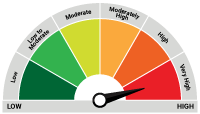 Investors understand that their principal will be at Very High Risk |
| Quantum Equity Fund of Funds An Open Ended Fund of Funds scheme Investing in Open Ended Diversified Equity Schemes of Mutual Funds | • Long term capital appreciation • Investments in portfolio of open-ended diversified equity schemes of mutual funds registered with SEBI whose underlying investments are in equity and equity related securities of diversified companies |  Investors understand that their principal will be at Very High Risk |
| Quantum India ESG Equity Fund An Open ended equity scheme investing in companies following Environment, Social and Governance (ESG) theme | • Long term capital appreciation •Invests in shares of companies that meet Quantum's Environment, Social, Governance (ESG) criteria. |  Investors understand that their principal will be at Very High Risk |
| Quantum Gold Fund An Open Ended Scheme Replicating / Tracking Gold | • Long term returns •Investments in physical gold | 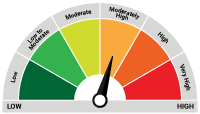 Investors understand that their principal will be at Moderately High Risk |
| Quantum Gold Savings Fund An Open Ended Fund of Fund Scheme Investing in Quantum Gold Fund | • Long term returns •Investments in units of Quantum Gold Fund – Exchange Traded Fund whose underlying investments are in physical gold |  Investors understand that their principal will be at Moderately High Risk |
| Quantum Multi Asset Fund of Funds An Open Ended Fund of Funds Scheme Investing in schemes of Quantum Mutual Fund | • Long term capital appreciation and current income •Investments in portfolio of schemes of Quantum Mutual Fund whose underlying investments are in equity , debt / money market instruments and gold |  Investors understand that their principal will be at Moderately High Risk |
| Quantum Liquid Fund An Open-ended Liquid Scheme. A relatively low interest rate risk and relatively low credit risk. | • Income over the short term •Investments in debt / money market instruments | 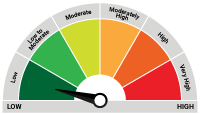 Investors understand that their principal will be at Low Risk |
| Quantum Liquid Fund An Open-ended Liquid Scheme. A relatively low interest rate risk and relatively low credit risk. | • Income over the short term •Investments in debt / money market instruments |  Investors understand that their principal will be at Low Risk |
The Risk Level of the Scheme in the Risk O Meter is based on the portfolio of the scheme as on May 31, 2022.
| Name of the Scheme | This product is suitable for investors who are seeking* | Riskometer | Riskometer |
| Quantum Dynamic Bond Fund An Open-ended Dynamic Debt Scheme Investing Across Duration. A relatively high interest rate risk and relatively low credit risk. | • Regular income over short to medium term and capital appreciation •Investment in Debt / Money Market Instruments / Government Securities | 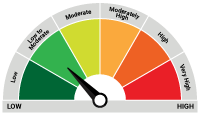 Investors understand that their principal will be at Low to Moderate Risk. | 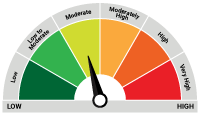 |
The Risk Level of the Scheme in the Risk O Meter is based on the portfolio of the scheme as on May 31, 2022.
The Risk Level of the Benchmark Index in the Risk O Meter is basis it's constituents as on May 31, 2022.
| Potential Risk Class Matrix - Quantum Liquid Fund | |||
| Credit Risk → | Relatively Low (Class A) | Moderate (Class B) | Relatively High (Class C) |
| Interest Rate Risk↓ | |||
| Relatively Low (Class I) | A-I | ||
| Moderate (Class II) | |||
| Relatively High (Class III) | |||
| Potential Risk Class Matrix – Quantum Dynamic Bond Fund | |||
| Credit Risk → | Relatively Low (Class A) | Moderate (Class B) | Relatively High (Class C) |
| Interest Rate Risk↓ | |||
| Relatively Low (Class I) | |||
| Moderate (Class II) | A-I | ||
| Relatively High (Class III) | |||
Disclaimer, Statutory Details & Risk Factors:
The views expressed here in this article / video are for general information and reading purpose only and do not constitute any guidelines and recommendations on any course of action to be followed by the reader. Quantum AMC / Quantum Mutual Fund is not guaranteeing / offering / communicating any indicative yield on investments made in the scheme(s). The views are not meant to serve as a professional guide / investment advice / intended to be an offer or solicitation for the purchase or sale of any financial product or instrument or mutual fund units for the reader. The article has been prepared on the basis of publicly available information, internally developed data and other sources believed to be reliable. Whilst no action has been solicited based upon the information provided herein, due care has been taken to ensure that the facts are accurate and views given are fair and reasonable as on date. Readers of this article should rely on information/data arising out of their own investigations and advised to seek independent professional advice and arrive at an informed decision before making any investments.
Mutual fund investments are subject to market risks read all scheme related documents carefully.
Please visit – www.QuantumAMC.com to read scheme specific risk factors. Investors in the Scheme(s) are not being offered a guaranteed or assured rate of return and there can be no assurance that the schemes objective will be achieved and the NAV of the scheme(s) may go up and down depending upon the factors and forces affecting securities market. Investment in mutual fund units involves investment risk such as trading volumes, settlement risk, liquidity risk, default risk including possible loss of capital. Past performance of the sponsor / AMC / Mutual Fund does not indicate the future performance of the Scheme(s). Statutory Details: Quantum Mutual Fund (the Fund) has been constituted as a Trust under the Indian Trusts Act, 1882. Sponsor: Quantum Advisors Private Limited. (liability of Sponsor limited to Rs. 1,00,000/-) Trustee: Quantum Trustee Company Private Limited. Investment Manager: Quantum Asset Management Company Private Limited. The Sponsor, Trustee and Investment Manager are incorporated under the Companies Act, 1956.
Related Posts
-

Understanding AMC: The Asset Management Company to Mutual Funds
Posted On Friday, Sep 06, 2024
In the world of mutual funds, the term "AMC" might appear frequently. AMC stands for Asset Management Company, and it manages the operation and management of mutual funds.
Read More -

IDCW Option in Mutual Funds: A Simple Guide for Investors
Posted On Thursday, Aug 29, 2024
The Indian mutual fund industry has grown incredibly fast over the past 10 years.
Read More -

How to Calculate Returns From an ELSS And Its Tax Implications
Posted On Friday, Feb 10, 2023
As you may know, there are multiple tax-saving options in India to save taxes under Section 80C of the Income Tax Act
Read More



